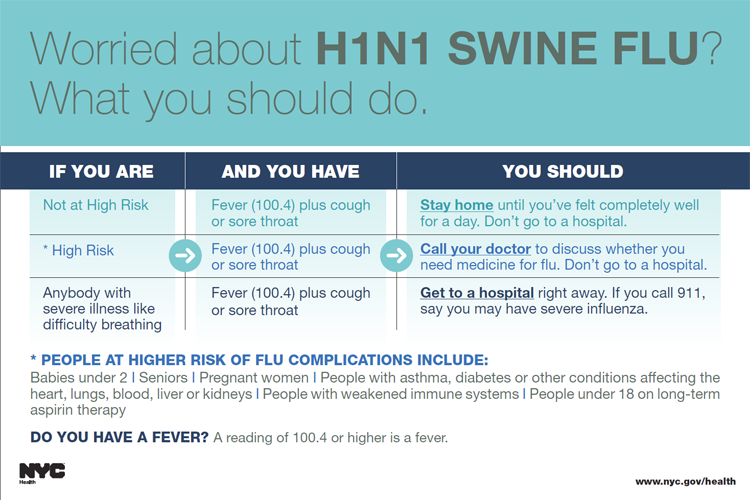H1N1
H1N1 Flu: What You Need to Know
What is H1N1 flu?
H1N1 flu (“swine flu”) is caused by a virus similar to regular (seasonal) flu. The illness can cause fever, cough, sore throat, tiredness, aches, chills and stuffy nose. H1N1 flu spreads when a sick person coughs or sneezes. You can also get infected by touching something with flu viruses on it and then touching your own mouth or nose.
How can I protect myself and others from H1N1 flu?
- Don’t get too close to people who are sick. If you get sick yourself, avoid close contact with other people.
- Cover your nose and mouth when you sneeze. And wash your hands often with soap and water or an alcohol-based hand cleaner.
What should I do if I develop flu-like symptoms, such as fever and cough?
- Stay home from school or work until 24 hours after your symptoms go away.
- If you are over 65, under 2 or pregnant – or you have asthma or other health problems – call your doctor to see if you need medicine. Your doctor may be able to give you a prescription over the phone.
- You don’t need to go to an emergency room unless you have severe symptoms, such as breathing problems.
When do I need medicine for the flu?
Most people recover without medication, but some people are more likely to get severely ill with the flu. Those at risk include everyone over 65, under 2 or pregnant, and anyone with other long-term health problems, such as asthma or diabetes.
- If you belong to one of these groups and you get come down with symptoms of flu, call your health care provider right away to get a prescription.
When should I go to the emergency room or hospital?
You don’t need to go the hospital or emergency room unless you have severe symptoms. Severe symptoms include:
- Trouble breathing or shortness of breath (rapid breathing in children)
- Pain or pressure in the chest or stomach
- Bluish skin color
- Dizziness or confusion
- Increasing fever
- Vomiting that won’t stop
Should I send my children to school?
- If your child is sick, he or she should stay home until 1 day after symptoms go away. Healthy children do not need to miss school unless classes are canceled. You can find out if your school is closing by visiting http://schools.nyc.gov/Home/Spotlight/closures.htm.
For more information: Visit www.nyc.gov/html/doh/html/cd/cd-h1n1flu.shtml




